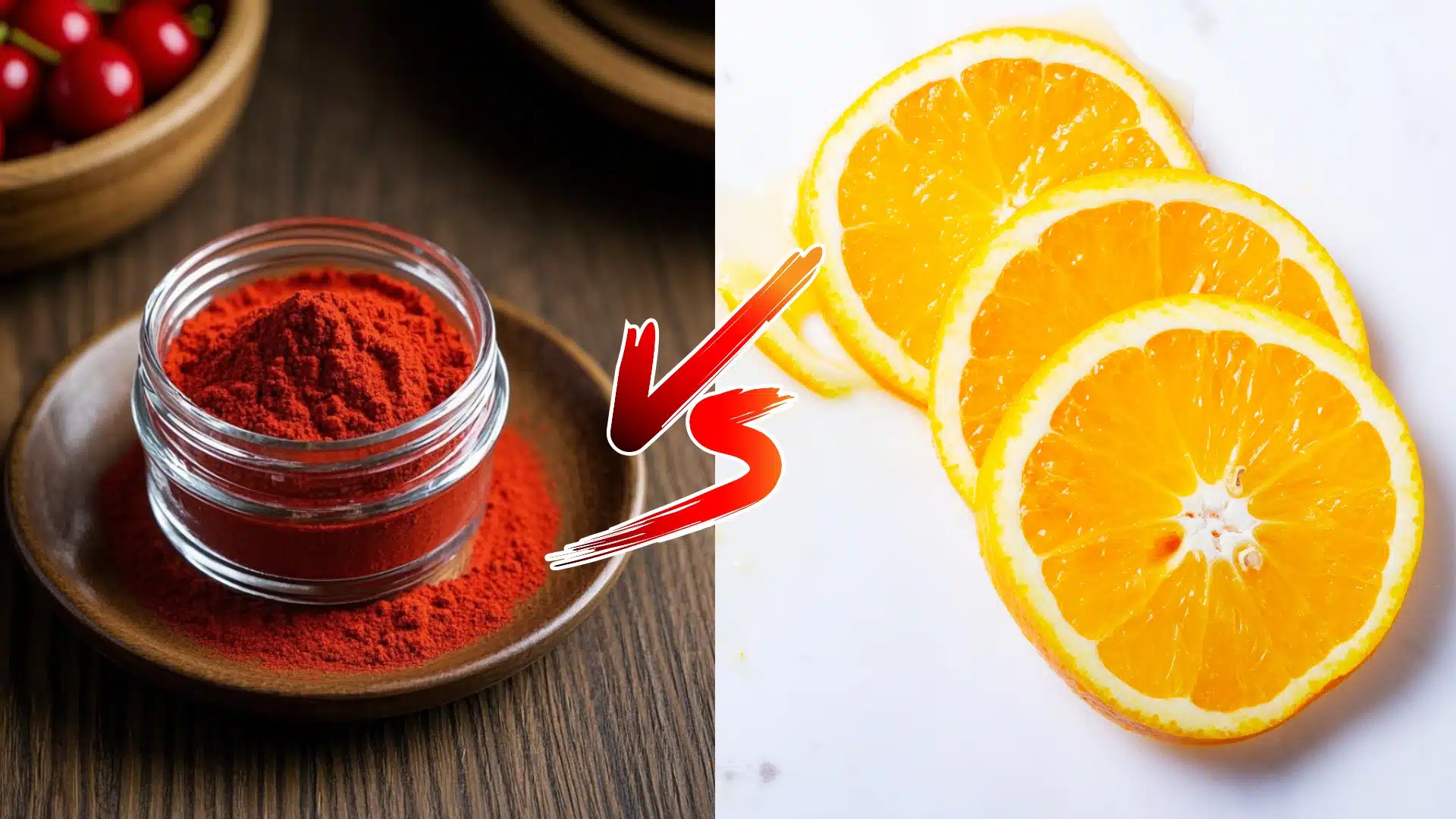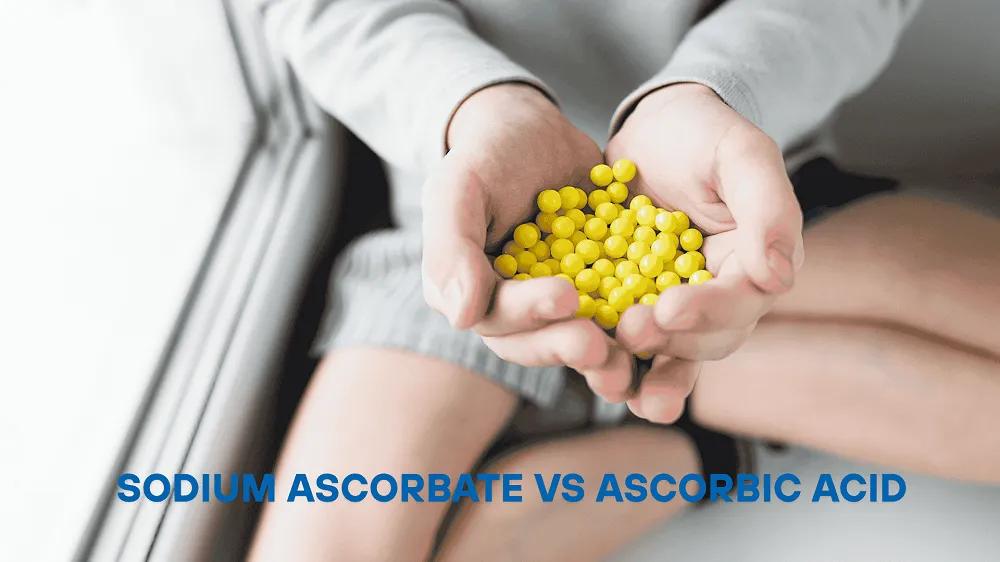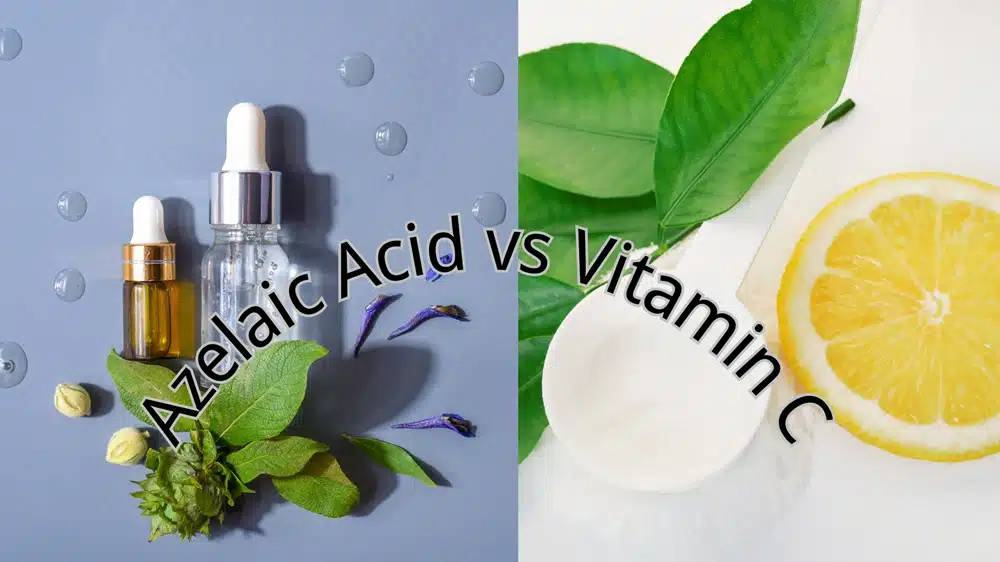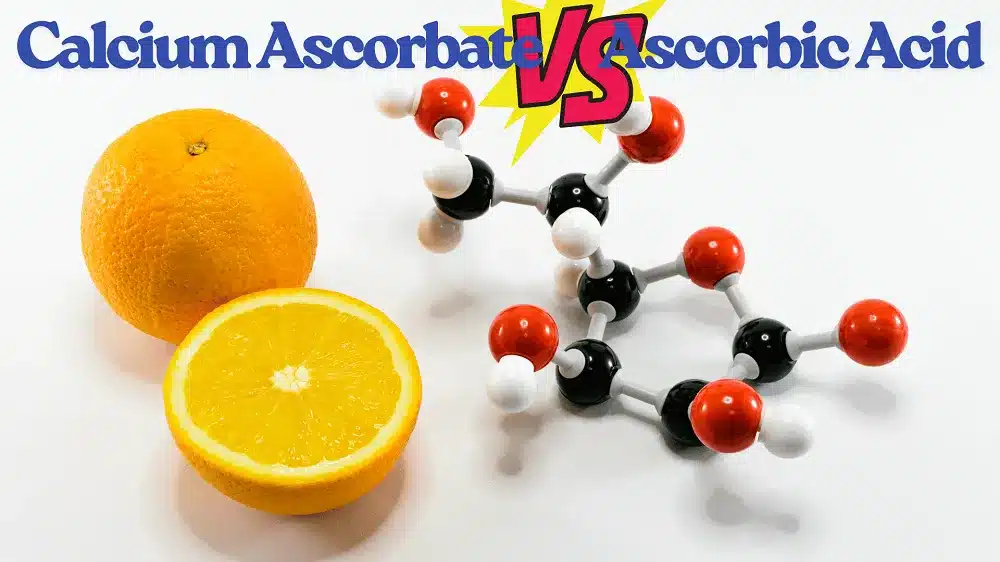건강 보조 식품 코너에 서서 끝없이 늘어선 비타민 C 제품들 때문에 당황한 적이 있으신가요? 한 손에는 값싼 아스코르브산 정제 한 병을, 다른 한 손에는 신비한 유기농 아세로라 체리 파우더 한 병을 들고 가격 차이가 그만한 가치가 있는지 궁금해하며 이 딜레마에 처음 부딪혔던 기억이 납니다. 스포일러 경고: 수년간의 연구와 개인적인 실험 끝에 저는 이것이 단순히 가격표에 관한 것이 아니라 합성 분리물과 자연의 완전한 패키지 중 하나를 선택하는 문제라는 것을 발견했습니다.

너무 많은 내용을 스크롤하고 싶지 않다면 유기농 아세로라 체리 파우더 대 아스코르브산 표로 바로 이동하여 명확하게 비교할 수 있습니다. 유기농 아세로라 체리 파우더 대 아스코르브산 표.
유기농 아세로라 체리 파우더란?
작은 체리 하나에 오렌지 한 개보다 더 많은 비타민 C가 들어 있다고 상상해 보세요! 이것이 바로 과학적으로 말피기아 에마르기나타로 알려진 아세로라 체리 식물의 마법입니다. 남아메리카와 카리브해의 열대 지방이 원산지인 이 생생한 붉은 체리는 수세기 동안 원주민 사회에서 소중히 여겨져 왔습니다.
나무에서 파우더가 되기까지의 과정은 놀라울 정도로 순조롭습니다. 잘 익은 아세로라 체리를 조심스럽게 수확한 다음 저온에서 동결 건조하거나 분무 건조하여 섬세한 영양소를 보존합니다. 결과는? 100g당 약 1,700mg의 천연 비타민 C를 함유한 미세하고 톡 쏘는 파우더가 탄생했습니다! 식품 과학 저널(2018)에 발표된 연구에 따르면, 이 보존 방법은 비타민 C뿐만 아니라 과일의 귀중한 식물 영양소도 유지한다고 합니다.
하지만 여기서 흥미로운 점이 있습니다. 아세로라 분말 에는 비타민 C뿐만 아니라 비타민 A, 티아민, 리보플라빈, 나이아신, 칼슘, 철분, 인과 같은 미네랄을 포함한 다양한 영양소가 함유되어 있는 황금빛 파우더입니다. 단일 성분으로 위장한 천연 종합 비타민이라고 생각하세요!
아스코르브산의 이해
이제 여러분의 약장 속에 있을 법한 비타민 C인 아스코르브산에 대해 이야기해 보겠습니다. 오해하지 마세요. 합성 비타민을 악당으로 만들려는 것은 아니지만, 우리 몸에 어떤 성분이 들어 있는지 이해하는 것이 중요합니다.
아스코르브산은 1930년대에 개발된 라이히슈타인 공법이라는 흥미로운 공정을 통해 제조됩니다. 이 공정은 포도당(주로 옥수수에서 추출)으로 시작하여 박테리아와 다양한 산을 포함하는 여러 화학적 변형을 거칩니다. 최종 결과는? 자연에서 발견되는 아스코르브산 분자와 분자적으로 동일한 순수한 결정질 비타민 C가 탄생합니다.
문제는 분자 자체는 동일하지만, 자연스러운 동반자 없이 문 앞에 도착한다는 점입니다. 파티에 혼자 참석하는 것과 팀원 전체를 데리고 참석하는 것의 차이처럼, 때로는 회사가 모든 차이를 만들어냅니다!
사람들이 아세로라 체리를 섭취하는 이유는?
사람들이 아세로라 체리 보충제를 찾는 이유는 마치 웰빙 위시리스트처럼 다양합니다. 무엇보다도 면역력 강화가 가장 큰 이유입니다. 2019년 국제 분자 과학 저널에 발표된 연구에 따르면 아세로라 체리 추출물을 정기적으로 섭취하면 기준치에 비해 면역 세포 기능이 최대 23%까지 향상되는 것으로 나타났습니다.
하지만 겨울철 콧물 퇴치에만 그치지 않습니다. 많은 사용자가 에너지 수준이 향상되었다고 보고하고 있으며, 이를 뒷받침하는 과학적 근거가 있습니다! 아세로라의 천연 비타민 C는 철분 흡수를 향상시켜 가벼운 철분 결핍으로 인한 피로를 해소할 수 있습니다. Reddit의 한 사용자는 "계속되는 피로 때문에 아세로라 체리 파우더를 복용하기 시작했는데, 2주 만에 제 삶을 되찾은 것 같은 기분이 들었습니다!"라고 공유했습니다.
미용에 관심이 많은 분들을 위해 (유죄를 선고합니다!) 아세로라가 다음과 같은 역할을 합니다. 콜라겐 합성을 돕는 스킨케어 슈퍼 히어로입니다. 비타민 C 성분은 신체의 자연적인 콜라겐 생성을 지원하여 시간이 지남에 따라 더욱 탄력 있고 빛나는 피부로 가꾸어 줍니다.
아세로라 체리 파우더의 효능: 비타민 C 그 이상
유기농 아세로라 체리 파우더가 진정으로 빛나는 이유는 비타민 C 함량 때문만이 아닙니다. 이 파우더에는 안토시아닌, 플라보노이드, 카로티노이드 등 생리 활성 화합물의 보고가 들어 있습니다. 이러한 성분은 단순한 미사여구가 아니라 비타민 C와 시너지 효과를 발휘하는 강력한 항산화제입니다.
식품 화학(2020)에 발표된 연구에 따르면 아세로라 체리에서 추출한 비타민 C의 생체이용률은 합성 아스코르브산보다 약 35% 높은 것으로 나타났습니다(실험 대상자가 섭취했을 때). 연구진은 비타민 C가 목적지에 효율적으로 도달할 수 있도록 돕는 호위병과 같은 역할을 하는 바이오플라보노이드가 존재하기 때문이라고 설명했습니다.
합성 아스코르브산은 솔로 연주자와 같고 아세로라 체리 파우더는 오케스트라의 전체 연주자와 같다고 생각하면 됩니다. 각 성분이 각자의 역할을 수행하여 부분의 합보다 더 큰 조화로운 건강상의 이점을 만들어냅니다. 천연 효소와 보조 인자의 존재는 신체가 영양소를 더 효과적으로 인식하고 활용한다는 것을 의미합니다.
아세로라 체리는 어떻게 섭취하나요?
체리 아세로라 파우더를 매일 섭취하는 방법은 놀라울 정도로 간단하며, 감히 말하건대 아주 즐겁습니다! 권장 복용량은 일반적으로 하루 1/4~1티스푼(약 1-4g)으로 170-680mg의 천연 비타민 C를 제공하며, 이는 이미 일일 권장 섭취량의 2-8배에 달하는 양입니다!
개인적으로 가장 좋아하는 음료는? 아침 스무디에 반 티스푼을 넣고 저어줍니다. 시큼하고 약간 달콤한 맛이 베리류 및 바나나와 잘 어울립니다. 어떤 날 아침에는 물 한 컵에 레몬을 짜서 섞어 즉석 비타민 C 레모네이드를 만들어 먹기도 합니다! 요리에 관심이 있다면 요거트 위에 뿌려 먹거나 홈메이드 에너지 볼에 섞어 보세요.
보관 팁: 파우더는 직사광선을 피해 밀폐 용기에 넣어 보관하세요. 비타민 C는 공기, 빛, 열에 노출되면 함량이 저하될 수 있습니다. 저는 햇볕이 잘 드는 주방 조리대에 첫 번째 병을 놓아두었을 때 큰 실수를 저질렀어요!
흡수율과 효과 비교
여기서 고무와 도로가 만나는 지점입니다. 여러 연구에서 천연 비타민 C와 합성 비타민 C의 흡수율을 비교했는데, 그 결과는 놀랍습니다. 2013년 영양학 저널에 발표된 한 연구에 따르면 비타민 C의 초기 혈중 농도는 두 가지 형태 모두 비슷하게 정점에 도달하지만, 천연 공급원이 24시간 동안 더 높은 혈장 농도를 유지하는 것으로 나타났습니다.
하지만 차트에 표시된 숫자가 모든 것을 말해주지는 않습니다. 영양사 동료인 Sarah는 고객들을 대상으로 비공식 실험을 실시했습니다. 절반은 아세로라 체리 보충제를, 절반은 아스코르브산을 섭취했습니다. 8주 후, 아세로라를 섭취한 그룹의 78%는 "눈에 띄게 더 활력이 넘친다"고 답한 반면, 아스코르빈산을 섭취한 그룹은 41%에 불과했습니다. 과학적으로 엄격하지는 않지만 이와 같은 실제 경험을 무시해서는 안 됩니다.
올바른 선택하기: 고려해야 할 요소
그렇다면 유기농 아세로라 체리 파우더와 아스코르브산 중 어떤 것을 선택해야 할까요? 정답은 없습니다. 아세로라 체리 파우더는 기본 아스코르브산보다 약 3~5배 더 비싸므로 예산을 먼저 고려하세요. 어떤 사람들에게는 전체 식품 영양에 대한 투자가 가치 있는 일이지만, 어떤 사람들에게는 합성 비타민 C가 완벽하게 맞을 수도 있습니다.
자신의 건강 목표도 생각해보세요. 빠듯한 예산으로 기본적인 면역력 지원을 원하신다면 아스코르브산이 좋습니다. 하지만 종합적인 항산화 보호, 흡수율 향상, 추가 영양소를 원한다면 아세로라 체리 파우더가 더 높은 가격에도 불구하고 뛰어난 가치를 제공합니다.
품질은 매우 중요합니다. 아세로라 체리 파우더를 선택할 때는 유기농 인증과 제3자 테스트를 거쳤는지 확인하세요. 가장 좋은 제품은 비타민 C 함량이 명확하게 표시되어 있고 필러나 인공 첨가물이 없는 제품입니다.
결론
수년 동안 이 두 가지 비타민 C 공급원을 비교한 결과, 저는 이 두 가지를 경쟁자가 아니라 서로 다른 일을 위한 서로 다른 도구로 생각하게 되었습니다. 아스코르브산은 믿을 수 있는 세단과 같아서 필요한 곳에 효율적이고 경제적으로 갈 수 있게 해줍니다. 유기농 아세로라 체리 파우더는 더 많은 비용이 들지만 추가 기능, 더 나은 성능, 더 부드러운 승차감을 제공하는 고급 SUV와 비슷합니다.
저는 매일 아세로라 체리 파우더를 선택했습니다. 자연이 의도한 대로 비타민 C를 섭취하고 다른 영양소도 함께 섭취한다는 사실에 안심이 되니 추가 투자할 가치가 충분합니다. 게다가 맛도 좋고 기분이 좋아져서 활력이 넘치고 피부가 맑아지고 아픈 날이 줄어드는 등 정말 만족스러워요.
가장 좋은 보충제는 실제로 꾸준히 섭취하는 것임을 기억하세요. 간단한 아스코르브산을 선택하든 복잡한 아세로라 체리 파우더를 선택하든, 건강을 위한 긍정적인 발걸음을 내딛는 것입니다. 내 몸에 귀를 기울이고, 필요하면 의료 전문가와 상의하여 자신의 웰빙 여정에 맞는 선택을 하세요.
유기농 아세로라 체리 파우더 대 아스코르브산 표
| 비교 요소 | 유기농 아세로라 체리 파우더 | 아스코르브산 |
|---|---|---|
| 출처 | 100% 아세로라 체리에서 추출한 내추럴 | 포도당으로 만든 합성, 실험실 생산 |
| 비타민 C 함량 | 17-25%(그램당 170-250mg) | 100%(그램당 1000mg) |
| 추가 영양소 | ✓ 비타민 A, 비타민 B, 미네랄, 바이오플라보노이드, 항산화제 | ✔ 참고 순수 비타민 C만 |
| 생체 이용률 | ★★★★★ 35% 흡수력 향상 | ★★★☆☆ 표준 흡수 |
| 가격 범위(월별) | $25-40 | $5-15 |
| 맛 | 쾌적하고 과일 향이 나는 타르트 | 신맛, 산성, 약용 |
| 부작용 위험 | 낮음 - 위장에 순함 | 보통 - 위장 장애를 일으킬 수 있습니다. |
| 항산화력 | 높음 - 여러 항산화제가 함께 작용 | 보통 - 비타민 C만 |
| 최상의 대상 | 전인적 건강, 흡수력 향상, 종합적인 영양 섭취 | 예산에 민감한, 고용량 필요, 기본 보충제 |
아세로라 체리 비타민 C가 아스코르브산보다 낫나요?
생체 이용률 측면에서 보면 그렇습니다. 연구에 따르면 아세로라 체리의 비타민 C는 합성 아스코르브산보다 약 35% 더 잘 흡수되는 것으로 나타났습니다. 아세로라에 함유된 천연 바이오플라보노이드와 효소는 체내 흡수와 유지력을 향상시킵니다. 그러나 "더 나은"은 개인의 필요와 예산에 따라 다릅니다. 특정 의학적 이유로 고용량이 필요한 경우 아스코르브산이 더 실용적일 수 있습니다.
유기농 아세로라 체리 파우더란 무엇인가요?
유기농 아세로라 체리 파우더는 유기농으로 재배한 체리를 조심스럽게 건조하고 갈아서 만든 농축된 형태의 아세로라 체리 열매입니다. 여기에는 자연 발생 비타민 C(중량 기준 약 17%)와 다른 비타민, 미네랄, 항산화제가 함유되어 있습니다. 유기농 인증은 재배에 합성 살충제나 화학 물질을 사용하지 않았음을 보장합니다. 본질적으로 강력한 단일 분말에 담긴 자연의 종합 비타민입니다!
아세로라를 섭취하면 안 되는 사람은 누구인가요?
신장 질환이 있는 사람, 특히 신장 결석이 생기기 쉬운 사람은 아세로라 보충제를 복용하기 전에 의사와 상담해야 합니다. 혈액 희석제를 복용하는 분도 비타민 C가 혈액 응고에 영향을 미칠 수 있으므로 의사와 상의해야 합니다. 체리 또는 라텍스에 알레르기가 있는 사람은 아세로라 제품을 피해야 합니다. 혈색소 침착증(철분 과부하 장애)이 있는 경우 비타민 C가 철분 흡수를 증가시키므로 주의해야 합니다.
아세로라 체리 파우더의 부작용은 무엇인가요?
가장 흔한 부작용으로는 다량 복용 시 소화 장애, 메스꺼움, 설사 등이 있습니다. 일부 사람들은 위경련이나 위산 역류를 경험할 수 있습니다. 이러한 효과는 일반적으로 경미하며 소량부터 시작하여 음식과 함께 분말을 섭취하면 최소화할 수 있습니다. 흥미롭게도 많은 사람이 아세로라 체리 파우더가 합성 비타민 C보다 위장에 더 부드럽게 작용한다고 합니다!
아세로라 체리는 히스타민 함량이 높나요?
아세로라 체리는 히스타민 함량이 높은 식품으로 간주되지 않습니다. 실제로 비타민 C 성분은 체내 히스타민 분해를 도울 수 있습니다. 그러나 히스타민 과민증이 심한 사람은 새로운 식품을 천천히 도입하고 반응을 모니터링해야 합니다. 히스타민 문제가 있는 일부 사람들은 실제로 아세로라가 증상 관리에 도움이 된다고 합니다!
가루를 녹이는 가장 좋은 방법은 무엇인가요?
비타민 C를 파괴하는 뜨거운 액체는 절대 사용하지 마시고 실온의 물을 사용하세요! 파우더와 2-3온스의 액체를 섞어 페이스트를 만든 다음 남은 액체를 추가하면 덩어리가 생기는 것을 방지할 수 있습니다. 우유 거품기를 사용하거나 메이슨 병에 넣고 흔들어도 좋습니다. 분말은 천연 과일 섬유질 때문에 합성 비타민 C처럼 완전히 녹지는 않지만, 이는 유익한 영양소가 작용하고 있다는 신호입니다!
이 제품은 어떻게 보관하나요?
아세로라 체리 파우더는 밀폐 용기에 담아 빛과 열이 닿지 않는 서늘하고 건조한 식료품 저장실에 보관하세요. 스토브 근처나 습기가 많은 욕실에 보관하지 마세요. 개봉 후에는 6~12개월 이내에 사용해야 최상의 효능을 얻을 수 있습니다. 팁: 습기를 흡수할 수 있도록 실리카겔 패킷이 있는 어두운 유리병에 옮겨 담으세요. 극심한 더위에 살지 않는 한 냉장 보관하지 마세요. 온도 변화는 결로 현상을 일으켜 분말을 손상시킬 수 있습니다.
아세로라의 비타민 C 함량은 얼마인가요?
신선한 아세로라 체리는 100g당 약 1,700mg의 비타민 C를 함유하고 있어 가장 풍부한 천연 비타민 공급원 중 하나입니다. 아세로라 체리 파우더에는 일반적으로 17-25%의 비타민 C가 함유되어 있어 1티스푼(4g)만 섭취해도 오렌지보다 10-15배 많은 약 680-1000mg의 천연 비타민 C를 섭취할 수 있습니다!
아세로라는 항염증 효과가 있나요?
맞습니다! 영양 생화학 저널(2019)에 발표된 연구에 따르면 아세로라 체리 추출물은 상당한 항염증 효능이 있는 것으로 나타났습니다. 비타민 C, 안토시아닌 및 기타 페놀 화합물의 조합이 함께 작용하여 체내 염증 표지자를 감소시킵니다. 단골 사용자들은 종종 관절 통증이 감소하고 운동 후 회복이 개선되었다고 보고합니다.
아세로라는 모발에 어떤 효능이 있나요?
아세로라의 높은 비타민 C 함량은 건강한 모발 성장에 필수적인 콜라겐 생성을 지원합니다. 비타민 C는 또한 철분 흡수를 도와 철분 결핍으로 인한 탈모를 예방합니다. 많은 사용자가 아세로라를 정기적으로 섭취한 후 모발이 더 윤기 있고 튼튼해졌다고 말합니다. 항산화제는 또한 모낭을 산화 스트레스로부터 보호할 수 있습니다!



